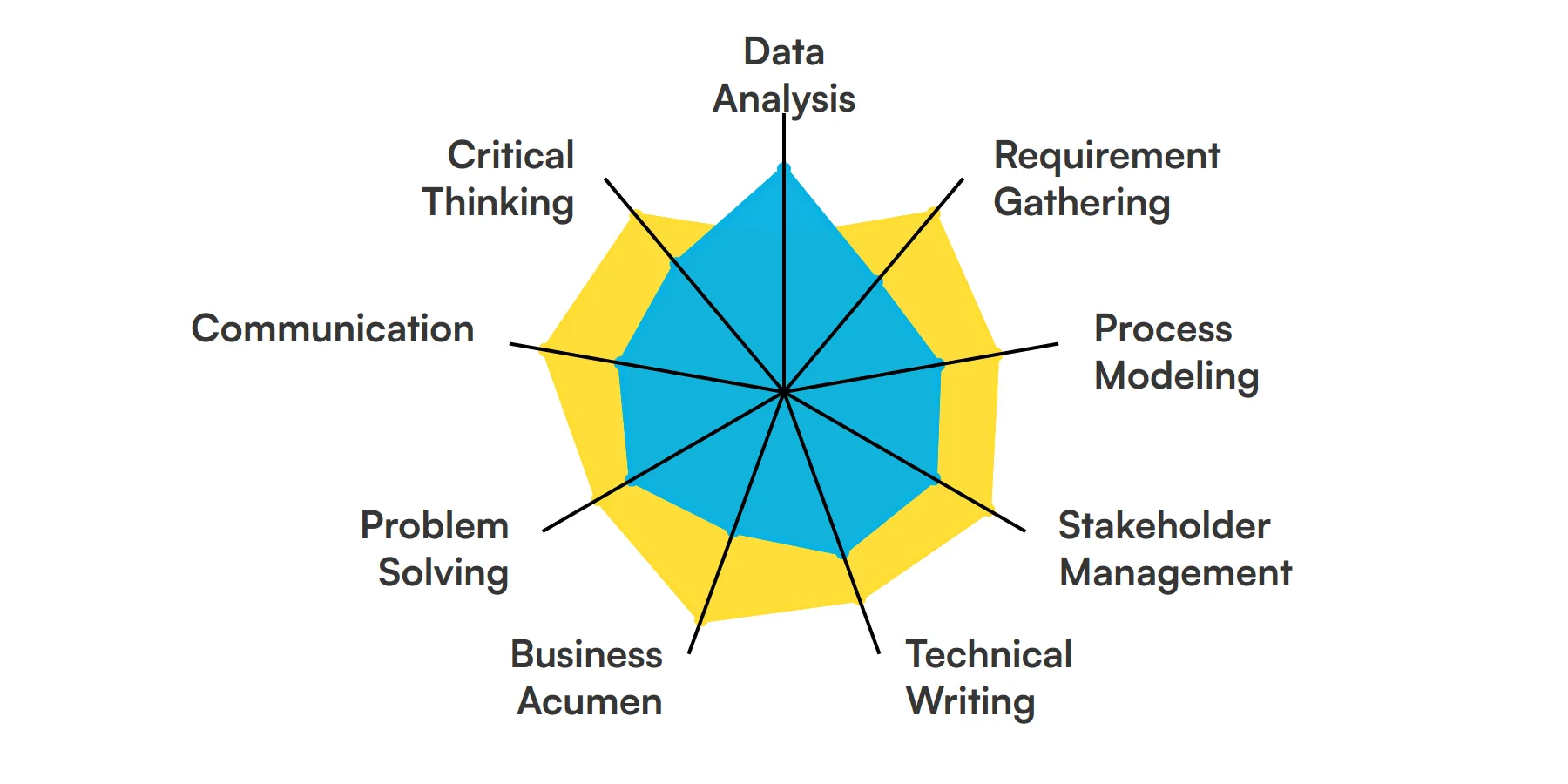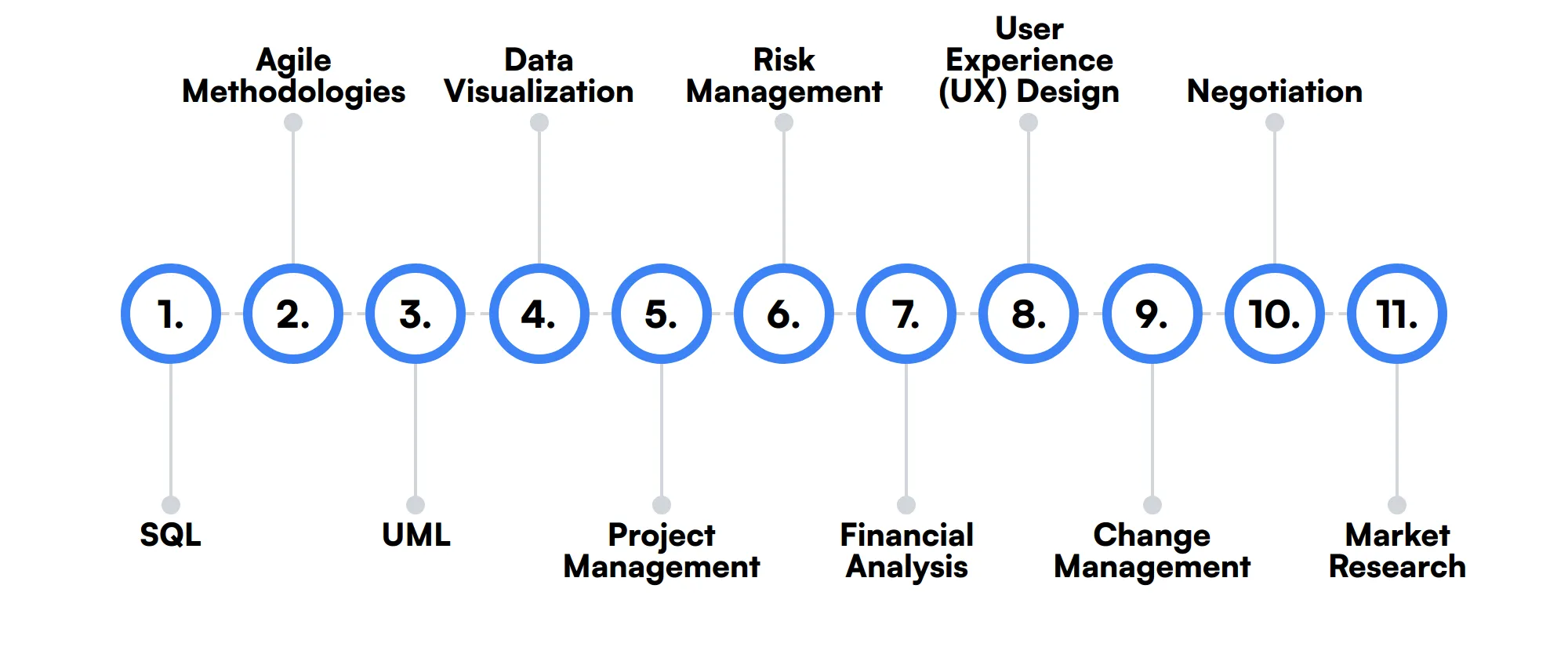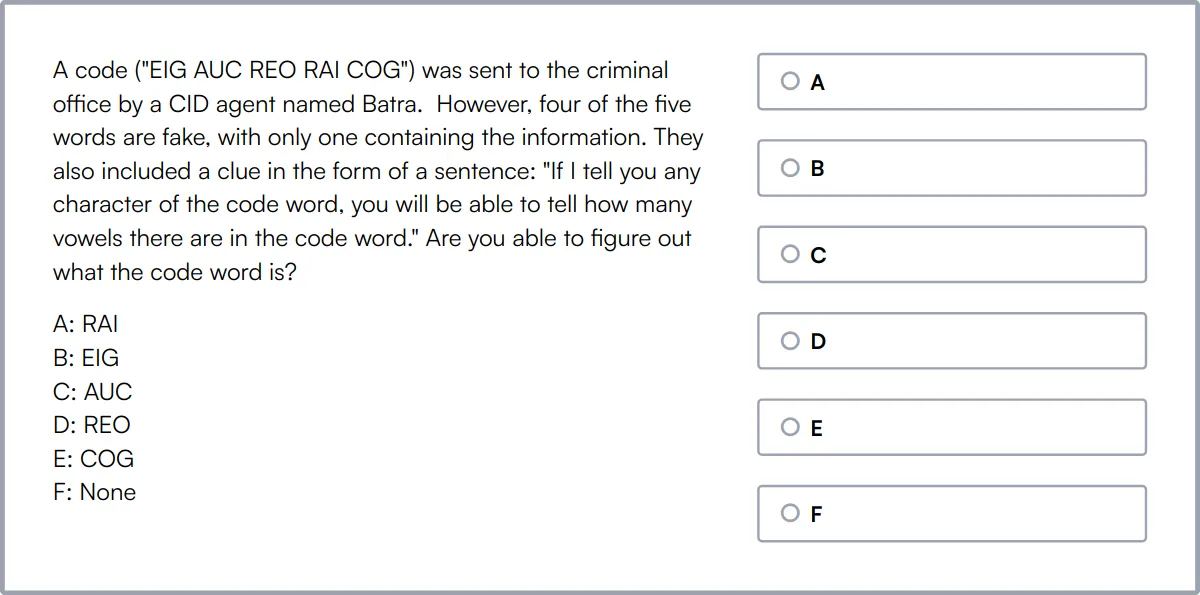A business analyst plays a key role in bridging the gap between IT and the business. They help organizations improve their processes, products, services, and software through data analysis. Business analysts ensure that business needs are translated into clear and actionable requirements for the development team.
Skills required for a business analyst include strong analytical abilities, excellent communication skills, and a good understanding of business processes. They must also be proficient in tools like Microsoft Excel, SQL, and various data visualization tools.
Candidates can write these abilities in their resumes, but you can’t verify them without on-the-job Business Analyst skill tests.
In this post, we will explore 9 essential Business Analyst skills, 11 secondary skills and how to assess them so you can make informed hiring decisions.
Table of contents
9 fundamental Business Analyst skills and traits
The best skills for Business Analysts include Data Analysis, Requirement Gathering, Process Modeling, Stakeholder Management, Technical Writing, Business Acumen, Problem Solving, Communication and Critical Thinking.
Let’s dive into the details by examining the 9 essential skills of a Business Analyst.

Data Analysis
Data analysis is at the heart of a business analyst's role. It involves examining data sets to draw meaningful conclusions, identify trends, and support decision-making. This skill helps in understanding the business performance and areas that need improvement.
For more insights, check out our guide to writing a Data Analyst Job Description.
Requirement Gathering
Requirement gathering involves collecting the needs and expectations of stakeholders. A business analyst uses this skill to ensure that the final product meets the business objectives and user needs. It is crucial for defining the scope of a project.
Process Modeling
Process modeling is the act of representing the processes of an enterprise in a structured way. Business analysts use this skill to visualize and analyze the current processes and design improved ones. It helps in identifying inefficiencies and areas for optimization.
Check out our guide for a comprehensive list of interview questions.
Stakeholder Management
Stakeholder management involves identifying and engaging with all parties affected by a project. A business analyst uses this skill to ensure that stakeholders' needs are met and to facilitate communication between different groups. It is key to project success.
Technical Writing
Technical writing is the ability to create clear and concise documentation. Business analysts use this skill to write requirements, user manuals, and reports. It ensures that all project documentation is understandable and accessible to all stakeholders.
For more insights, check out our guide to writing a Technical Writer Job Description.
Business Acumen
Business acumen is the understanding of how a business operates and makes money. A business analyst uses this skill to align project goals with business strategy. It helps in making informed decisions that drive business growth.
Problem Solving
Problem solving involves identifying issues and finding effective solutions. Business analysts use this skill to tackle challenges that arise during a project. It is essential for overcoming obstacles and ensuring project success.
Check out our guide for a comprehensive list of interview questions.
Communication
Communication is the ability to convey information clearly and effectively. Business analysts use this skill to interact with stakeholders, present findings, and facilitate meetings. It ensures that everyone is on the same page and that information flows smoothly.
Critical Thinking
Critical thinking involves analyzing facts to form a judgment. Business analysts use this skill to evaluate data, identify patterns, and make decisions. It is crucial for developing strategies and solving complex problems.
For more insights, check out our guide to writing a Business Analyst Job Description.
11 secondary Business Analyst skills and traits
The best skills for Business Analysts include SQL, Agile Methodologies, UML, Data Visualization, Project Management, Risk Management, Financial Analysis, User Experience (UX) Design, Change Management, Negotiation and Market Research.
Let’s dive into the details by examining the 11 secondary skills of a Business Analyst.

SQL
SQL is used for managing and manipulating databases. Business analysts often use SQL to query databases and extract relevant data for analysis.
Agile Methodologies
Understanding Agile methodologies helps business analysts work effectively in Agile environments. It involves iterative development and collaboration with cross-functional teams.
UML
Unified Modeling Language (UML) is used for visualizing system architecture. Business analysts use UML to create diagrams that represent system components and their interactions.
Data Visualization
Data visualization involves presenting data in graphical formats. Business analysts use this skill to create charts and dashboards that make data insights easily understandable.
Project Management
Project management skills help business analysts plan, execute, and monitor projects. It involves managing resources, timelines, and deliverables to ensure project success.
Risk Management
Risk management involves identifying and mitigating potential risks. Business analysts use this skill to foresee issues that could impact project outcomes and develop strategies to address them.
Financial Analysis
Financial analysis involves evaluating financial data to make business decisions. Business analysts use this skill to assess the financial viability of projects and initiatives.
User Experience (UX) Design
UX design focuses on creating products that provide meaningful and relevant experiences to users. Business analysts use this skill to ensure that the end product is user-friendly and meets user needs.
Change Management
Change management involves preparing and supporting individuals to adopt changes. Business analysts use this skill to ensure smooth transitions during project implementations.
Negotiation
Negotiation skills help business analysts reach agreements with stakeholders. It involves finding mutually beneficial solutions and resolving conflicts.
Market Research
Market research involves gathering information about market conditions. Business analysts use this skill to understand market trends and inform strategic decisions.
How to assess Business Analyst skills and traits
Assessing the skills and traits of a Business Analyst involves more than just glancing at a resume. It's about understanding how well they can handle real-world business scenarios, from data analysis to stakeholder management. A comprehensive evaluation requires a method that goes beyond traditional interviews to include practical assessments.
While resumes may highlight a candidate's experience and certifications, they don't necessarily reflect their true capability in areas like problem solving, communication, and critical thinking. This is where skills-based assessments come into play, offering a deeper insight into a candidate's practical abilities.
Adaface assessments provide a tailored approach to evaluate the multifaceted skills of Business Analysts. By simulating real-life business problems, these tests measure a candidate's proficiency across essential areas such as requirement gathering, process modeling, and technical writing. Utilizing Adaface can lead to a 2x improvement in the quality of hires and significantly streamline the screening process.
Let’s look at how to assess Business Analyst skills with these 6 talent assessments.
Data Analysis Test
Our Data Analysis Test evaluates a candidate's ability to analyze and interpret data, crucial for roles requiring the extraction of actionable insights from complex datasets.
The test assesses skills in data modeling, SQL queries, and data interpretation, focusing on practical applications like anomaly detection, predictions, and using popular data tools such as Excel.
Candidates who perform well demonstrate proficiency in handling large datasets and the ability to derive meaningful insights that can influence business decisions.

Business Analyst Test
Our Business Analyst Test screens candidates on their ability to define and solve business problems, an important skill for effective business analysis.
This test covers data analysis, requirements gathering, critical thinking, and SQL fundamentals, ensuring candidates can handle real-world business scenarios.
High scorers will have demonstrated strong analytical skills and the ability to communicate complex data clearly to stakeholders.

Financial & Excel Modeling Test
The Financial & Excel Modeling Test assesses a candidate's expertise in financial planning and analysis, essential for finance-related roles.
Candidates are tested on financial forecasting, reporting, valuation, and Excel modeling skills, ensuring they can manage and predict financial health effectively.
Successful candidates will show a deep understanding of financial metrics and the ability to model financial scenarios in Excel.
Technical Aptitude Test
Our Technical Aptitude Test evaluates a candidate's foundational knowledge in programming and system management, key for technical roles.
The test challenges candidates with questions on data structures, algorithms, and general technical problem-solving, reflecting real-world issues.
A high score indicates strong logical reasoning and technical problem-solving capabilities.
Business Analyst Aptitude Online Test
The Business Analyst Aptitude Online Test gauges a candidate's ability in core business analysis tasks like SWOT analysis and risk analysis.
It tests analytical thinking, data sufficiency, and process improvement skills, crucial for optimizing business processes and decision-making.
Candidates excelling in this test are well-equipped to handle complex business challenges and drive strategic improvements.
Problem Solving Test
Our Problem Solving Test assesses a candidate's ability to approach and solve complex problems, a necessary skill across various job roles.
This test evaluates abstract reasoning, critical thinking, and spatial reasoning, reflecting a candidate's problem-solving skills in dynamic and challenging environments.
Effective problem solvers identified by this test are likely to adapt quickly to new challenges and efficiently resolve issues.

Summary: The 9 key Business Analyst skills and how to test for them
| Business Analyst skill | How to assess them |
|---|---|
| 1. Data Analysis | Evaluate ability to interpret and derive insights from data sets. |
| 2. Requirement Gathering | Assess skill in identifying and documenting business needs. |
| 3. Process Modeling | Check proficiency in creating visual representations of business processes. |
| 4. Stakeholder Management | Gauge effectiveness in engaging and managing stakeholder expectations. |
| 5. Technical Writing | Review clarity and precision in documenting technical information. |
| 6. Business Acumen | Measure understanding of business operations and industry trends. |
| 7. Problem Solving | Assess capability to identify issues and develop effective solutions. |
| 8. Communication | Evaluate clarity and effectiveness in conveying information. |
| 9. Critical Thinking | Check ability to analyze situations and make reasoned decisions. |
Business Analyst Aptitude Online Test
Business Analyst skills FAQs
What are the key skills a Business Analyst should possess?
A Business Analyst should be skilled in Data Analysis, Requirement Gathering, Process Modeling, and Stakeholder Management. Additionally, proficiency in Technical Writing, Business Acumen, and Problem Solving is important.
How can recruiters assess a candidate's proficiency in SQL and Data Visualization?
Recruiters can assess SQL and Data Visualization skills through practical tests, such as SQL queries on sample databases and creating reports or dashboards from given data sets.
What is the importance of Agile Methodologies and UML in a Business Analyst role?
Agile Methodologies help Business Analysts manage projects flexibly, while UML (Unified Modeling Language) aids in visualizing system architectures and processes.
How can communication and negotiation skills impact a Business Analyst's effectiveness?
Strong communication skills enable clear information exchange, while effective negotiation skills help in aligning diverse stakeholder goals, crucial for project success.
What techniques can be used to evaluate a Business Analyst's risk and project management capabilities?
Evaluating these capabilities can be done through scenario-based questions that explore how candidates handle potential project risks and manage resources.
Why is user experience (UX) design knowledge important for Business Analysts?
Understanding UX design helps Business Analysts ensure that the end product meets user needs and provides a seamless user interaction, enhancing product value.
How does financial analysis contribute to the role of a Business Analyst?
Financial analysis skills enable Business Analysts to assess project viability, budget allocations, and potential ROI, influencing strategic business decisions.
What role does market research play in the effectiveness of a Business Analyst?
Market research provides insights into market trends and customer needs, helping Business Analysts to tailor projects and strategies to meet market demands.
Assess and hire the best Business Analysts with Adaface
Assessing and finding the best Business Analyst is quick and easy when you use talent assessments. You can check out our product tour, sign up for our free plan to see talent assessments in action or view the demo here:

40 min skill tests.
No trick questions.
Accurate shortlisting.
We make it easy for you to find the best candidates in your pipeline with a 40 min skills test.
Try for freeRelated posts
Free resources



